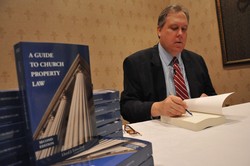Too often, church property disputes are complicated and heart-wrenching. How do civil courts determine where the line gets drawn regarding land and building division and ownership? Who receives the title or trust for the property? What is a just compensation when one party decides to leave or abandon their religious denomination?
Lloyd Lunceford, an attorney and author of The Guide to Church Property Law, addressed those questions at the Presbyterian Lay Committee breakfast Monday at the 219th General Assembly (2010).
Lunceford says that among ways to settle disputes are trial by combat, trial by ordeal, and trail by law.
Determining ownership of local church property in a hierarchical denomination is not always black and white. States that have adopted the “neutral principles of law” method may have a hard time if churches don’t have the documentation to back their claims in property disputes. The PC(USA) asserts trust over all church property. But that doesn’t mean the presbytery will have the proper articles of incorporation.
Lunceford’s closing statement sums up his presentation: “Remember, our choices must be worthy of our God. It is not a matter of staying or leaving, it is a matter of trust.”

